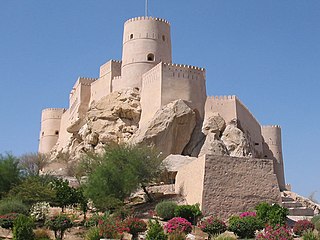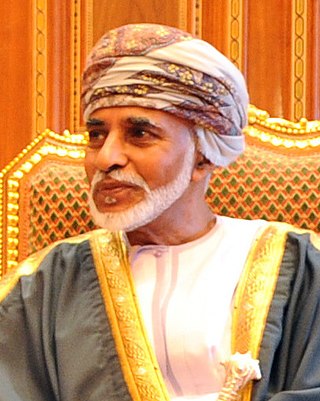| |||||
| Decades: | |||||
|---|---|---|---|---|---|
| See also: | |||||
| |||||
| Decades: | |||||
|---|---|---|---|---|---|
| See also: | |||||

Oman is a site of pre-historic human habitation, stretching back over 100,000 years. The region was impacted by powerful invaders, including other Arab tribes, Portugal and Britain. Oman, at its height, held holdings that ranged from the Persian Gulf all the way south to the island of Madagascar, some notable holdings include; the island of Zanzibar and the city of Gwadar.

The Politics of Oman takes place in the context of a unitary absolute monarchy, where the Sultan of Oman is both head of state and head of government. The Sultan is hereditary, who appoints a cabinet to assist him. The sultan also serves as the supreme commander of the armed forces and prime minister.

Muscat is the capital and most populous city in Oman. It is the seat of the Governorate of Muscat. According to the National Centre for Statistics and Information (NCSI), the population of the Muscat Governorate in 2022 was 1.72 million. The metropolitan area includes six provinces, called wilayats, and spans approximately 3,500 km2 (1,400 sq mi), making it the largest city by area on the Arabian Peninsula. Known since the early 1st century CE as a leading port for trade between the west and the east, Muscat was ruled successively by various indigenous tribes, as well as by foreign powers such as the Persians, the Portuguese Empire and the Ottoman Empire. In the 18th century, Muscat was a regional military power: its influence extended as far as East Africa and Zanzibar. As an important port town in the Gulf of Oman, Muscat attracted foreign traders and settlers such as the Persians, the Balochs and the Sindhis. Beginning in 1970, after the accession of Qaboos bin Said as the Sultan of Oman, Muscat experienced rapid infrastructural development; it developed a vibrant economy and became a multi-ethnic society. The Globalization and World Cities Research Network classifies Muscat as a Beta-level Global City.

Said bin Taimur was the 13th Sultan of Muscat and Oman from 10 February 1932 until he was deposed on 23 July 1970 by his son Qaboos bin Said.

Qaboos bin Said Al Said was Sultan of Oman from 23 July 1970 until his death in 2020. A fifteenth-generation descendant of the founder of the House of Al Said, he was the longest-serving leader in the Middle East and Arab world at the time of his death, having ruled for almost half a century.

"The Salute of the Sultan" is the national anthem of the Sultanate of Oman. It is an ode originally dedicated to Qaboos bin Said, the former Sultan of Oman.

Muttrah, administratively a wilayah (province), is located in the Muscat Governorate of Oman. Before the discovery of oil in Oman, Muttrah was the center of commerce in Oman (Muscat). It is still a center of commerce as one of the largest seaports of the region is located there. Other landmarks include Souq Muttrah, a traditional bazaar and Sour Al-Lawatiah, a small community of houses surrounded by an old wall. To the south lies Muscat District.

Salalah is the capital and largest city of the southern Omani governorate of Dhofar. It has a population close to 331,949.

The Sultanate of Muscat and Oman, also known briefly as the State of Muscat and Oman during the rule of Taimur bin Feisal, was a sovereign state that encompassed the present-day Sultanate of Oman and parts of present-day United Arab Emirates and Pakistan, in the second half of the 19th century and 20th century. Ruled by the Busaid dynasty, it was established as a result of the partition of the Omani Empire upon the death of its last ruler Said bin Sultan. The Sultanate transitioned into a new form of government after the palace coup of 23 July 1970 in which the sultan Said bin Taimur was immediately deposed in favor of his son Qaboos bin Said.

Sultan Qaboos University (SQU) is a public university located in al-Seeb, Oman. Established in 1986, it is one of the two public universities in the country and is named after Qaboos bin Said al-Said, the Sultan of Oman from 1970 until 2020.
Sayyida Mazoon bint Ahmad bin Ali Al Mashani was a member of the Omani royal family. She was the second wife of Sultan Said bin Taimur and the mother of Sultan Qaboos bin Said.
The following is a list of public holidays in Oman.

In line with the Arab League position in relation to Israel, Oman does not officially recognize the state of Israel and took part in the boycott of Israel during much of the 20th century.

Haitham bin Tariq Al Said is Sultan and Prime Minister of Oman.
This article lists events from the year 2017 in Oman.

The 1970 Omani coup d'état was the overthrow of Sultan of Oman Said bin Taimur by his son Qaboos bin Said in Oman on 23 July 1970. Occurring in the midst of the Dhofar War, the palace coup was executed with the British and saw Sultan Said bin Taimur deposed and sent into exile to the United Kingdom. The coup was a pivotal moment in modern Omani history as Qaboos swiftly set in motion numerous wide-ranging modernisation reforms in the sultanate, transforming Oman from an underdeveloped backwater into a country on par with many Western states in terms of political stability and economic development. At the time of his death in January 2020, Sultan Qaboos was the longest-serving ruler in the Middle East.

Sayyid Asa'ad bin Tariq Al Said is a member of the Omani royal family and the Deputy Prime Minister for Relations and International Cooperation Affairs.
This articles lists events from the year 2020 in Oman.
Sayyid Tariq bin Taimur Al Said was a member of the Omani royal family and the first prime minister of the Cabinet of Oman. Tariq was the son of Sultan Taimur bin Feisal, brother of Sultan Said bin Taimur, uncle of Sultan Qaboos bin Said, and father of Sultan Haitham bin Tariq.